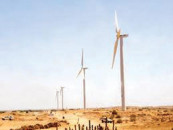The week in focus
After electricity shortages in the summer, focus has shifted to gas shortfall in the face of rising demand in winter.

After acute electricity shortages in the summer, the focus has shifted to gas shortfall in the face of rising demand in winter with the government grappling to cope with the situation. Energy supply has taken centre stage in economic affairs with no swift solution in sight except for rationing supplies among different stakeholders, including textile mills, fertiliser manufacturers, power plants, residential consumers, CNG outlets and others.
In a meeting last week, the cabinet directed the Ministry of Petroleum and Natural Resources to give preference to domestic consumers in gas supply during winter. The government extended gas outages for Punjab industries from three to four days a week, prompting desperate calls from textile millers.
On Friday, Sui Northern Gas Pipelines Limited also stopped supply to Engro’s major fertiliser plant at a time of crop sowing, particularly of wheat.
Shaken by the prolonged gas outages, the textile industry is holding regular press conferences and protest rallies to make its voice heard and press the government to ensure gas supply to this labour-intensive industry, which will not be able to meet export orders at a time of heavy demand for Christmas. The industry says it is operating much below capacity, putting jobs of thousands of workers at stake.
On the other side, fertiliser plants need uninterrupted gas supply, which is a basic raw material, to keep producing urea and di-ammonium phosphate (DAP) to meet the requirements of farmers, who are sowing different crops, particularly the staple food wheat. Owing to less-than-required production, fertiliser prices have jumped in the market, prompting the need for import.
Among other consumers, residential users also require gas for cooking and heating purposes while power producers require this energy source to keep their plants running.
The shortage of energy underscores the need for aggressive oil and gas exploration and avoiding political and other disputes, particularly in areas which are rich in resources. “Dynamic policies should be formulated to accelerate drilling in energy-rich areas,” said Faisal Shaji, Research Head of Standard Capital Securities.
He particularly mentioned District Kohlu near Dera Bugti, which holds 22 trillion cubic feet of recoverable gas reserves, where work should be started by settling all issues. However, Zin block which has smaller reserves should be left for the future.
The Qadirpur gas field also offers a huge potential to bridge most of the gap between demand and supply in the face of depleting reserves of Sui field. “Qadirpur gas field should be developed further as it offers an alternative to Sui and can contribute significantly to the country’s energy needs,” Shaji said.
Besides stepping up exploration domestically, the country has also the option of imports, particularly of liquefied natural gas (LNG) and supplies from resource-rich Iran. A good volume of LNG can be imported from Qatar but all impediments should be set aside to fast track the import of gas, Shaji said.
He termed the Pak-Iran gas pipeline agreement a milestone and called for expediting work on the project by settling the pricing issue with Tehran. Iran has almost completed its part of the pipeline while Pakistan has still not even started construction.
According to Shaji, pricing is not a significant issue when looked at in the backdrop of energy shortage in the country. Energy supply is vital to keep the wheels of industry running, encourage new investment and bring in foreign investors.
Published in The Express Tribune, December 12th, 2011.


















COMMENTS
Comments are moderated and generally will be posted if they are on-topic and not abusive.
For more information, please see our Comments FAQ